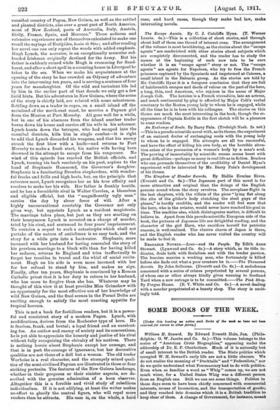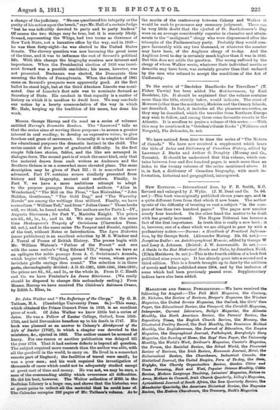SOME BOOKS OF THE WEEK.
[Under this hooding we setts. such Books of the wish so ham net been reserved for review in other forma.] William H. Seward. By Edward Everett Hale, Jun. (Phila- delphia: G. W. Jacobs and Co. 5s.)—This volume belongs to the series of "American Crisis Biographies," appearing under the editorship of Dr. E. P. Oberholtzer. Much of it is naturally but of small interest to the British reader. The State politics which occupied W. H. Seward's early life are not a little obscure. We do not realize the meaning of "Ducktails " and "Federalists," nor do we quite understand what Freemasonry had to do with politics. Even when so familiar a word as " Whig " comes up, we are not much wiser, for a 'United States Whig was a different person from an English one. Still we can see some things. Politics in those days seem to have been chiefly concerned with commercial interests, means of locomotion, and the transportation of goods; and they reached into domains which it is a British tradition to keep clear of them. A change of Government, for instance, meant a change of the judiciary. "No one que,stionedhis integrity or the purity of his action upon the bench," says Mr. Hall of a certain Judge "but he was inflexibly devoted to party and to party leaders." Of course the two things may be true, bat it is scarcely likely. Seward, representing the Whigs, had two terms as Governor of New York State, not a lucrative office by the way, and in 1849— he was then forty-eight—he was elected to the United States Senate. The slavery question was now becoming the great issue of the time, and it was to influence the rest of Seward's political Kfe. With this change the biography receives new interest and importance. When the Presidential election of 1856 was immi- nent Seward was a possible candidate ; his name, however, was not presented. Buchanan was elected, the Democrats thus securing the State of Pennsylvania. When the election of 1861 came on Seward's prospects were apparently good. At the first ballot he stood high, but at the third Abraham Lincoln was nomi- nated. One of Lincoln's first acts was to nominate Seward as Secretary of State. His conduct in that capacity is a matter of history on which it is needless to dwell here. We may conclude our notice by a hearty commendation of the way in which Mr. Hale, keeping up the tradition of his name, has done his work.







































 Previous page
Previous page